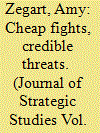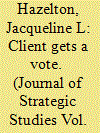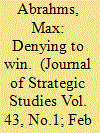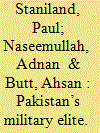| Srl | Item |
| 1 |
ID:
173811


|
|
|
|
|
| Summary/Abstract |
Drones are considered poor coercion tools: They cannot operate in contested airspace and they offer low-cost fights instead of more credible, costly signals. However, this article finds that technological advances will soon enable drones to function in hostile environments. Moreover, drones offer three unique coercion advantages that theorists did not foresee: sustainability in long duration conflicts, certainty of precision punishment which can change the psychology of adversaries, and changes in the relative costs of war. A unique survey of 259 foreign military officers finds that costly signals are less credible than assumed and that drones demonstrate resolve in new ways.
|
|
|
|
|
|
|
|
|
|
|
|
|
|
|
|
| 2 |
ID:
173815


|
|
|
|
|
| Summary/Abstract |
The belief that U.S. military advisors in South Vietnam did not know how to conduct a counterinsurgency campaign underpins belief that reforms are necessary for counterinsurgency success. However, contemporaneous U.S. documents show that military officers in the advisory period, 1954–1965, believed in the need for reforms and pressed their South Vietnamese counterparts to implement them. If advisors urged their partners to liberalize and democratize, yet the state remained autocratic, repressive, and corrupt, what explains the South Vietnamese failure to reform? I identify the client state’s ability and will to resist reforms as an important overlooked element of counterinsurgency campaigns.
|
|
|
|
|
|
|
|
|
|
|
|
|
|
|
|
| 3 |
ID:
173812


|
|
|
|
|
| Summary/Abstract |
Terrorism carries high audience costs for militant leaders because the attacks on civilians risk tarnishing the entire group as immoral extremists. Image-savvy militant leaders reduce the reputational fallout to the group whenever members commit terrorism. Specifically, the leaders distance their organization from civilian attacks by denying them. In this paper, I identify two types of denial strategies regularly employed by militant leaders, their effectiveness for image restoration, and how Islamic State paid a price for failing to employ them.
|
|
|
|
|
|
|
|
|
|
|
|
|
|
|
|
| 4 |
ID:
173813


|
|
|
|
|
| Summary/Abstract |
The Pakistan Army is a politically important organization, yet its opacity has hindered academic research. We use open sources to construct unique new data on the backgrounds, careers, and post-retirement activities of post-1971 corps commanders and directors-general of Inter-Services Intelligence. We provide evidence of bureaucratic predictability and professionalism while officers are in service. After retirement, we show little involvement in electoral politics but extensive involvement in military-linked corporations, state employment, and other positions of influence. This combination provides Pakistan’s military with an unusual blend of professional discipline internally and political power externally – even when not directly ruling.
|
|
|
|
|
|
|
|
|
|
|
|
|
|
|
|
| 5 |
ID:
173814


|
|
|
|
|
| Summary/Abstract |
This article explores the extent to which Moscow’s modus operandi during the military campaign in Syria demonstrates change or continuity in Russian strategic culture. It discusses five main characteristics of the Russian conduct and argues that these traits demonstrate more continuity than change in the Russian style of war. However, it suggests that change possibly might be evolving on the tactical-operational level – the emergence of a mission command culture. The article offers competing explanations for this eventuality, which the Syrian campaign has highlighted, and advances a conceptual debate in IR on the shifts in strategic culture.
|
|
|
|
|
|
|
|
|
|
|
|
|
|
|
|